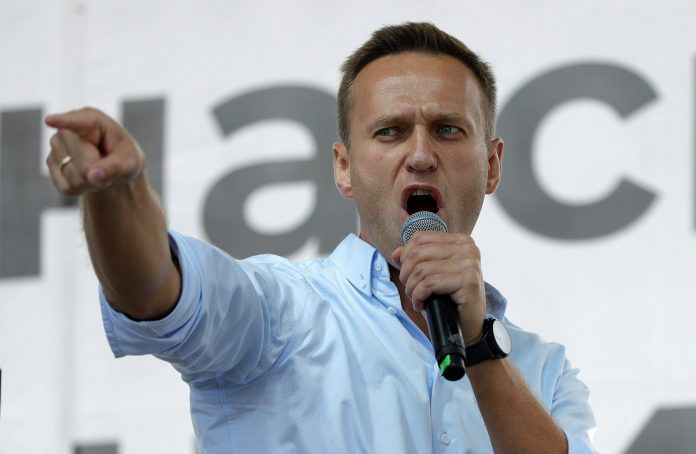
MOSCOW (AP) — Russian opposition leader Alexei Navalny on Monday released a recording of a phone call he said he made to an alleged state security operative, who revealed some details of how the politician was supposedly poisoned and media identified as a member of a team that has reportedly trailed Navalny for years.
The man in the recording indicated that he was involved in cleaning up Navalny’s clothes “so that there wouldn’t be any traces” after Russian President Vladimir Putin’s top critic fell into a coma while on a domestic flight over Siberia. During the recorded call, the man said that if the plane hadn’t made an emergency landing, “the situation would have turned out differently.”
The man, who was named in a news report last week as an operative from Russia’s FSB domestic security agency, pointed to Navalny’s underwear as a place where the substance that poisoned the politician may have been planted.
Navalny fell sick during the Aug. 20 flight in Russia and was flown to Berlin while still in a coma for treatment two days later. Labs in Germany, France and Sweden, and tests by the Organization for the Prohibition of Chemical Weapons, established that he was exposed to a Soviet-era Novichok nerve agent.
Russian authorities have vehemently denied any involvement in the poisoning.
Last week, the investigative group Bellingcat released a report alleging that operatives from Russia’s FSB domestic security agency followed Navalny during his trips since 2017, had “specialized training in chemical weapons, chemistry and medicine,” and some of them were “in the vicinity” of Navalny in the timeframe “during which he was poisoned.”
The investigation, conducted by Bellingcat and Russian news outlet The Insider in cooperation with CNN and German news outlet Der Spiegel, identified the supposed FSB operatives after analyzing telephone metadata and flight information.
Navalny, who is convalescing in Germany, said the report proved beyond doubt that FSB operatives tried to kill him on Putin’s orders. On Monday, he posted a video on his YouTube channel Monday titled “I called my killer. He confessed.”
The video showed him speaking on the phone with one of the alleged operatives. Bellingcat and other media outlets identified the man Navalny said he spoke with as Konstantin Kudryavtsev, a trained chemical-weapons specialist. The investigation alleged that Kudryavtsev traveled to Omsk — the Siberian city where the plane carrying Navalny when he became ill made an emergency landing and where the comatose politician first was hospitalized — several days after Navalny was airlifted to Berlin.
Navalny said he phoned the alleged FSB operative hours before the Bellingcat report was released. Navalny introduced himself as an aide to Russian Security Council Secretary Nikolai Patrushev and said he urgently needed to debrief the man on what had happened in another Siberian city, Tomsk, where the politician believes he was poisoned.
The conversation lasted 45 minutes, Navalny said. Bellingcat and The Insider published the full recording and transcripts of it.
The man on the other end of the call indicated that he was involved in the “processing” of Navalny’s clothes so “there wouldn’t be any traces.” The clothes Navalny was wearing when he was hospitalized in a coma have not been returned to him.
The man acknowledged knowing several other supposed FSB operatives mentioned in the Bellingcat investigation. A few times, he expressed reluctance to speak on an unsecured line, but kept answering Navalny’s questions without calling the politician by name or naming the toxic substance to which he was exposed.
While posing as a Security Council aide, the politician asked “what went wrong” and why Navalny survived the poisoning. The man on the other end replied “it would have all gone differently” if the plane hadn’t made the emergency landing and “if (it had) not (been) for the prompt work of the ambulance medics on the runway.”
When Navalny asked which of item of clothing bore the highest concentration of the toxin, the man said it was the underwear. He suggested that the substance was “absorbed quickly” and that was why no traces of it could have been found on the politician’s body.
The man also indicated that he was aware of the international scandal that followed Navalny’s illness: “I watch TV, too, and read the internet. They weren’t expecting all of this, I’m sure, that everything went the wrong way.”
The Associated Press was not able to independently verify the identity of the man with whom Navalny spoke in the video or his claims. The FSB told the Russian state news agency Tass that the recording Navalny released was fake.
The video received over 5.5 million views on YouTube within hours of being posted.
Earlier this month, Russian officials brushed off the investigation by Bellingcat and other media outlets.
Putin charged last week that the investigation relied on data provided by U.S. spy agencies. Its authors have denied any link to U.S. or any other Western intelligence services.
“It’s not some kind of investigation, it’s just the legalization of materials provided by U.S. special services,” the Russian leader alleged during his annual press conference. He said that means Navalny “relies on the support of U.S. special services.”
“It’s curious, and in that case, special services indeed need to keep an eye on him,” Putin said. “But that doesn’t mean that there is a need to poison him. Who would need that?”
Navalny, who is an anti-corruption investigator as well as a politician, is one of Kremlin’s fiercest critics. His Foundation for Fighting Corruption has been exposing graft among government officials, including some at the highest level.
The most prominent member of Russia’s opposition, Navalny campaigned to challenge Putin in the 2018 presidential election, but was barred from running. He set up a network of campaign offices across Russia and has since been putting forward opposition candidates in regional elections, increasingly putting pressure on members of Russia’s ruling party, United Russia.

